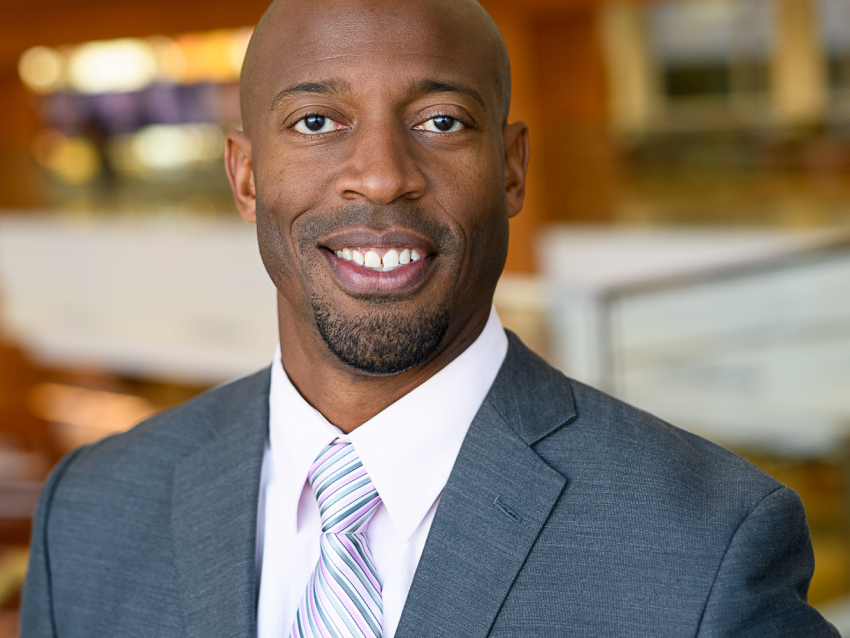
The Power of a Kentucky Degree
A pharmacist’s role goes beyond checking pills and managing refills; they build relationships with patients and make a difference. O'Shea Hudspeth, Class of 2007, is a testament to the high moral character the University of Kentucky (UK) hopes to foster in its students.
Originally from Murray, Ky., Hudspeth knew he wanted to find the same hometown feeling while pursuing a pharmacy education. When he found his place at UK College of Pharmacy (UKCOP), he didn't look back.
“Going to UK, and then working here in Lexington after I graduated, I knew this is where I wanted to be and start a family. The UK College of Pharmacy had the facilities and location and was top-ranked as well. It was an easy choice,” says Hudspeth.
Hudspeth originally started as a pharmacy technician at Kroger in 2002 while attending Georgetown College, where he played football and majored in biology. It was there he decided on his career path, and in the fall of 2003, he began pharmacy school at UKCOP and joined Kroger as a pharmacy intern.
When asked about his most meaningful interactions with patients, Hudspeth shares about helping patients through their battles with cancer and heart disease, many of whom mentioned how important it was that he spoke directly to them and asked how they were doing. He notes, “I’m grateful to be able to further relationships with my patients in a unique way. While pharmacists are true medication experts, we’re also one of the most trusted healthcare professionals. I take that responsibility seriously.”
After pharmacy school, Hudspeth worked at over 20 Kroger locations throughout central Kentucky. “I was at a different store nearly every day,” he remembers. “Floating to those pharmacies allowed me to learn some great lessons on how I wanted to practice. The second weekend after obtaining my license, I was also fully prepared to work solo. That’s the power of a Kentucky degree,” he states.
In all, Hudspeth spent 17 years with Kroger. He had patients that came in every day to see him. “I found something I was passionate about,” he says. “It clearly came out in my work.” He is also quick to note the additional impact he has as a Black man working in healthcare.
“I am a Black pharmacy manager at a time when there are not many Black men and women in community pharmacy. I can be an example for kids who don't have a Black doctor or dentist or don't often see someone like me in this type of position. There aren't many of us in the pharmacist role.”
Recent data supports Hudspeth’s experience, showing that Black pharmacists make up only 5% of the professionals in their field, and 9% of those currently enrolled in pharmacy school for the 2018-2019 academic year, according to the American Association of Colleges of Pharmacy. This is most likely due to systematic and systemic discrimination, often linked to mandatory standardized tests like the Pharmacy College Admission Test (PCAT) or inequitable hiring practices. Hudspeth notes, “I’m glad to see that UKCOP is starting to take more deliberate steps to make pharmacy a more appealing choice for young Black students interested in the medical field.”
During his tenure at Kroger, Hudspeth impacted countless lives, and he continues to be an example and mentor for other Black students hoping to pursue a healthcare career.
Most recently, Hudspeth joined UK HealthCare to manage its retail location within Chandler Hospital. In addition to traditional community pharmacy duties, he reviews patient charts, consults on medication, and assists in discharging patients. He is also involved in the hospital’s Meds-to-Bed program, a free concierge bedside service specifically to help patients leave the hospital with their necessary medications without additional hassle.
“I believe in taking advantage of the many roles a pharmacist can play,” says Hudspeth. “There is so much out there, so many opportunities to have relationships with your patients. I enjoy working with the public, but there is an array of options within this profession. Whether it be community, hospital, nuclear, research, or another pharmacy field, you have to find something that you enjoy.”
Hudspeth continues to lean into what it means to be a patient-centered provider. When asked about his proudest accomplishment since graduating, he talks about his new position at UK Chandler or working at Lexington's busiest Kroger store. “Professionally, every step along the way has been an accomplishment,” Hudspeth says. This includes all techs and interns who have worked under him who now have blossoming careers.
In terms of his personal life, Hudspeth says he is blessed with a beautiful family. “My wife is passionate about pharmacy, and we have three awesome kids. I am so happy about the family life this career has allowed,” he says.
Hudspeth met his wife Brooke (Hicks) Hudspeth while the two were at pharmacy school. Brooke is UKCOP’s newly appointed Chief Practice Officer and another alum of the Class of 2007. Caring for patients and making a difference is a passion for both husband and wife, and the University of Kentucky is proud to recognize Drs. O’Shea and Brooke Hudspeth as part of the alumni family.
A version of this story first appeared on the UK Alumni Blog.
